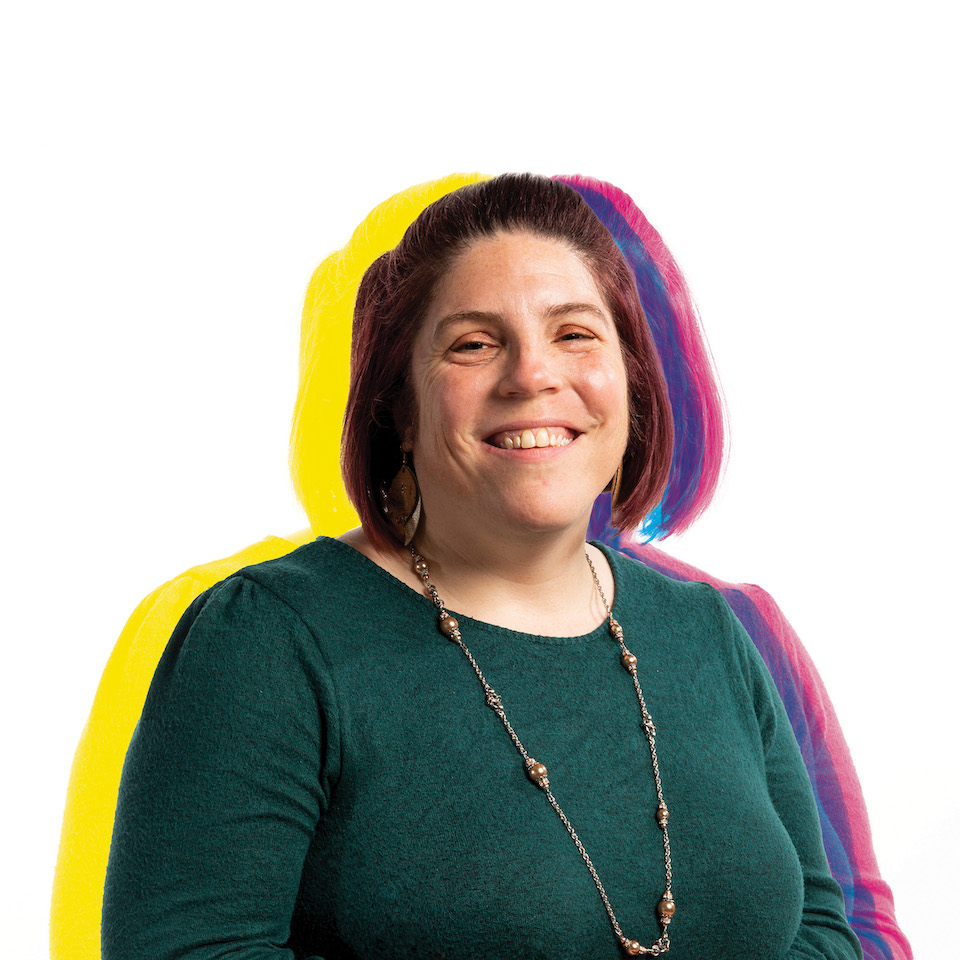
The 2022 Women of UD
Dr. Allison P. Leigh

DIRECTOR / MARIANIST STRATEGIES / OFFICE FOR MISSION AND RECTOR
Allison Leigh thought about the past two years and determined it was her vulnerability that made her stronger. “I was one of the people who was furloughed and, given that, the pandemic hit me harder than I thought it was going to. It was a lot harder to stomach, and it also really made me think differently about the institution and what’s valued.” She spent a considerable amount of mental and emotional energy trying to grasp the factors that motivated the furlough decision-making, hoping to find explanations that made the administration’s choices impersonal. “I think one way of exhibiting strength is to not get mired in your own emotions, looking for people to blame all the time, but actually recognizing what’s happening to yourself and then working through that. I think there’s a vulnerability in admitting how hard I struggled with that instead of just pretending that it was OK.”
In order to help others develop this grace, Leigh shares her struggle with the reality of her furlough when speaking at MEA Formation sessions. She uses it as a specific example to convey to the Educational Associates that strength can be “trying to understand where other people are coming from, even when things happen that you don’t agree with.” This was not a sudden realization; Leigh remembers tapping into the same well on the road to overcoming a debilitating back injury in 2014. For two months she was “pretty much confined to my couch,” but the pain was layered: “There was a great deal of physical pain and there was really a great deal of emotional pain, and on top of that, my family doesn’t live in town.” She focused her mental energy on ways to get through each day and on finding things to appreciate, whether it was a person visiting with food, or someone offering a ride to physical therapy and lunch afterward. “I think learning how to deal with something that was so painful for so long made me recognize that it had to get better at some point. Now I realize things that are bad aren’t permanent, even if they go on for a long time.”
Just as her life experience with traumatic injury helped her find equilibrium during the furlough, making connections between life events contributes to Leigh’s ability to adapt in her job, too. She went through MEA Formation in 2014 with Ryan Allen (LTC) and afterward the two had conversations about creating and offering reflection strategies to other Associates. She was excited by the idea because although she deeply values the University’s mission and Marianist identity, “It’s 200 years old and we need to make it relevant for today.” They developed a “Head, Heart, Hands, and Feet” model and a companion presentation titled “Reflecting on Marianist Leadership.” The program encourages participants to ask themselves: Am I seeking to understand? Am I acting with compassion? Am I focused on the task at hand? Am I saying “yes” to where I'm called to be? Leigh and Allen strive to adapt the program to their audience. “We haven’t done the same presentation twice. We've done it over 40 times all over campus. We did it for Dining Services and there were 150 people. We’ve done it for groups of MEAs at the end of their formation. They need different things from us.” Leigh says of all the work she has done at UD, she is most proud of the Marianist Leadership presentation. “I think it reflects a commitment to our mission and identity. My adaptability is making the mission adaptable.”
But Leigh has reservations about how the University can preserve its mission and move forward given events of the past couple of years. “We will need to reckon with the things that we can’t unsee or can’t unlearn,” she says. The trauma and grief associated with living and working in the pandemic will have to be recognized, and Leigh believes this comes down to careful deliberation of personal versus communal needs. She suspects that most of the tension stems from a rush to return to the way things were, and that causes inherent friction between “a culture of this is the way we did things before” and “what options do we have now?” Leigh believes the best course for the University is to take seriously the new information it has about what was and wasn't working prior to the pandemic and furloughs. “I think the biggest hurdle is trying to move forward without meaningful reflection and intentionality.” She acknowledges that this is a precarious time for not just the University, but for higher education in general, but believes a balance can be found. “What gives me hope is that there are people who do embrace the “Head, Heart, Hands and Feet” model. “I don't know if we'll listen to them, but there are people who do this.” Much as she did during the time she was injured, and as well, during the time she was furloughed, Leigh says she will rely on her strength and adaptability to find ways to amplify the sometimes muted voices of parts of the campus community. “I see myself contributing because I value authenticity. When there are critical things that I feel are being missed, I'm going to speak up.”
